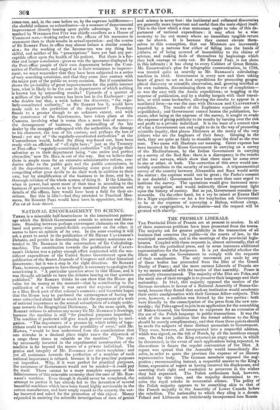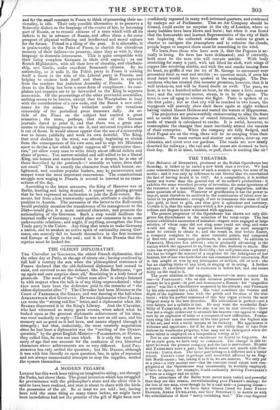THE PRUSSIAN LIBERALS.
THE Provincial Diets of Prussia are at present in session. In all of them numerous petitions have been presented from the towns. The majority ask for greater publicity in the transaction of all business that concerns the public—in the courts of law, in the municipal assemblies, and in the meetings of the provincial legis- latures. Coupled with these requests is, almost universally, that of freedom for the periodical press, and in some instances additional representatives for the burgesses. It is yet doubtful whether the Diets will urge the Government to comply with the requests of their constituents. The only movement yet made by any of these bodies has proceeded from the Diet of the Grand Duchy of Posen ; and the more earnest Liberals of Prussia are by no means satisfied with the tactics of that assembly. Posen is peculiarly circumstanced. The majority of the Diet are Poles, and the main aim of their struggle is to preserve their language and their nationality. In 1841, this majority opposed the motion of the German members in favour of a National Assembly of States-Ge- neral, because they feared that such an institution would accelerate their entire amalgamation with their German fellow-subjects. This year, however, a coalition was formed by the two parties : both were friendly to the emancipation of the press from the new cen- sorship; the Poles agreed to join in an application for the assembling of States-General, the Germans to cooperate for an extension of the use of the Polish language in public transactions. It was the wish of the more judicious that the formal address to the King should be merely complimentary, and that these three points should be made the subjects of three distinct memorials to Government. They were, however, all incorporated into a respectful address, which was signed, on the 8th of March, by all the members except one. On the 14th, the King returned an angry answer, in which he threatened, in the event of such applications being repeated, to discontinue in future the regular convocation of the Diet. A report was spread that the Assembly would immediately dis- solve, in order to spare the province the expense of an illusory representative body. The German members opposed the sug- gestion ; recommending instead, a respectful answer to the King's letter, expressive of regret at having incurred his displeasure, and asserting their right and resolution to persevere in the wishes they had expressed. The Polish enthusiasm had, however, subsided by this time, and the majority determined to re- ceive the royal rebuke in reverential silence. The policy of the Polish majority appears to be something akin to that of the French majority in the Assembly of Lower Canada before the rebellion. The nationality to which they cling is a dream. Poland and Lithuania are irretrievably incorporated into Russia and for the small remnant in Posen to think of preserving their na- tionality', is idle. Their only possible alternative is to preserve a Sclavonic dialect as the language of the courts of law, by becoming part of Russia, or to remain citizens of a state which with all its defects is far in advance of Russia, and offers them a far surer prospect of physical wellbeing and intellectual and moral culture for the future. Poland is a thing of the past. It is allowable, it is praiseworthy in the Poles of Posen, to cherish the chivalrous memory of their fathers—to preserve, since they so wish it, their language in domestic intercourse. This is quite compatible with their being complete Germans in their civil capacity : as our Scotch Highlanders, with all their love of clanship, and chieftain- ship, and Gaelic, make excellent Sassenach citizens. By its nationality, as it calls it, the Polish party in Posen is making itself a thorn in the side of the Liberal party in Prussia, and helping to enslave both itself and them. More is expected from the resolute but judicious Assembly of Prussia. Its ad- dress to the King has been a mere form of compliment : its com- plaints and requests are to be forwarded to the King in separate memorials. Of the proceedings of the other provincial assemblies, nothing seems to be known, except that the Westphalian is busy with the consideration of a new code, and the Saxon a new ordi- nance for the mines. The irritation under the vexatious censorship of the periodical press increases daily. An ar- ticle of the Times on the subject had excited a great sensation the more, perhaps, that none of the German journals dared to print it, and that there was a great con- course to the reading-rooms to see it, and universal inquiries after it out of doors. It would almost appear that the use of a censorship was to insure publicity and work its own downfal. The King, that reed shaken by the wind, was already beginning to shrink from the consequences of his own acts, and to urge his Ministers anew to devise a law which might suppress all" destructive theo- ries," yet allow every man to write freely about official delicts and abuse of power. Too narrow-minded and self-willed to be a liberal King, too honest and warm-hearted to be a despot, he is one of those described by the patriarch—" unstable as water' thou shalt not excel." This is exactly the character from which honest, en- lightened, and resolute popular leaders, may by perseverance and temper wrest the most important concessions. The constitutional struggle now waging in Prussia is second in interest to no trans- actions of the day. According to the latest accounts, the King of Hanover was at Berlin, feasting and being feasted. A report was gaining ground that he had expressed an inclination to join the Zoll-verem. Ru- mours, but from a less trustworthy quarter, attribute a similar dis- position to Austria. The accession of the latter to the Zoll-verein would probably occasion the transference of its management to the Diet—would give it a more national character, and promote the nationalizing of the Germans. Such a step would facilitate the internal traffic of Germany' would place our commerce in no more unfavourable relations ; and might, if anything, strengthen the Free Trade party in the Union. Any thing that tends to make Germany a nation, and to awaken an active spirit of nationality among Ger- mans, can scarcely fail to benefit themselves in the first instance and Europe at large in the end ; and it is from Prussia that the inpetus must be looked for.



























 Previous page
Previous page